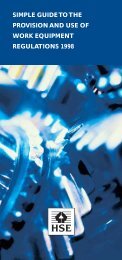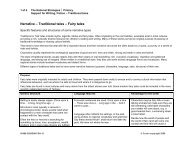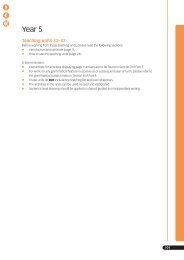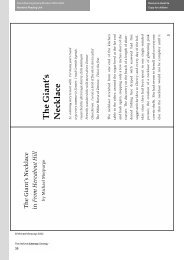Create successful ePaper yourself
Turn your PDF publications into a flip-book with our unique Google optimized e-Paper software.
Teaching key writing skills Guided writing<br />
a. Planning<br />
Writers spend time preparing, mulling ideas over, finding<br />
out information, generating ideas and organising their<br />
thoughts before they start to write. Teaching children to<br />
create a simple, manageable plan for their writing can<br />
help them improve because it frees their attention from<br />
worrying about ‘what to say next’.<br />
b. Drafting<br />
Key skills for committing the text to paper include:<br />
�<br />
�<br />
�<br />
�<br />
�<br />
�<br />
�<br />
�<br />
�<br />
�<br />
�<br />
�<br />
�<br />
�<br />
�<br />
�<br />
�<br />
rehearsing sentences and parts of sentences<br />
revising before and during writing<br />
concentrating, imagining and not being distracted<br />
away from the flow of composition<br />
constant rereading to help compose what happens<br />
next<br />
selecting words for maximum effect<br />
creating, controlling and varying sentences<br />
using connectives to make the text cohere<br />
selecting stylistic devices, such as using similes or<br />
alliteration, to add power<br />
using the plan to help write the next section<br />
using any checklists, prompts or referring back to<br />
models used in reading<br />
remembering to complete any specific targets.<br />
c. Revising and checking<br />
<strong>Writing</strong> should be read aloud to hear how it sounds.<br />
Pupils should assist each other, developing the skills of<br />
reading critically and considering sensitively what is<br />
effective in a text and how it might be improved. It should<br />
be routine for children to check for aspects of writing that<br />
they find difficult.<br />
Attitudes to writing<br />
Keen writers:<br />
have positive self image as a writer<br />
participate in shared sessions<br />
concentrate during writing<br />
reread as a reader<br />
show enjoyment and commitment.<br />
fluent handwriting and presentation.<br />
department epartment for<br />
education and skills<br />
Use guided writing to secure the link between phonics<br />
and basic spelling and handwriting in the early stages.<br />
Later on use guided writing to teach children who have<br />
not made progress through whole class teaching, or to<br />
challenge more confident writers.<br />
�<br />
�<br />
�<br />
�<br />
What interferes with composition?<br />
Composition will be made more difficult if certain basic<br />
skills are not automatic. Young writers need to have<br />
secured:<br />
a range of spelling strategies<br />
fluent handwriting and presentation<br />
the ability to create sentences with correct<br />
punctuation<br />
the ability to create, and write from, simple plans.<br />
Marking writing<br />
Identify effective examples to show to the class. Select a<br />
few examples that have weaknesses common to most of<br />
the class. Use these to teach revision. Revision should be<br />
focused on improving a selected aspect. Comment on<br />
aspects of the writing that are effective. Then identify<br />
parts of the writing that need to be improved – underline<br />
weak words, clumsy sentences, poorly constructed<br />
paragraphs, or where the text needs reorganising.<br />
Celebrate progress and set new targets.<br />
National Curriculum and NLS Objectives<br />
The NLS objectives link with and support work in the rest of the<br />
curriculum in several ways. We can:<br />
� Bring content knowledge and reading/writing activities from<br />
the curriculum into the Literacy Hour. Work in the Literacy<br />
Hour is then linked to real purposes for reading, writing,<br />
speaking and listening.<br />
� Teach language and literacy in both the Literacy Hour and<br />
other subjects, weaving the work in subjects and the Literacy<br />
Hour explicitly together.<br />
� Apply and practise the skills learned in the literacy our in new<br />
contexts in the rest of the curriculum.<br />
� Use language work done in other subjects to access<br />
children’s English abilities.<br />
Linking QCA Units of Work and NLS <strong>Writing</strong> Objectives<br />
In order to help with planning, links have been mapped between<br />
NLS objectives and existing writing activities within QCA schemes<br />
of work for history, geography, science, religious education and<br />
design and technology.<br />
Visit the QCA website:<br />
� www.qca.org.uk/ca/subjects/english/literacy<br />
DfES Publications<br />
Tel 0845 60 222 60 Fax 0845 60 333 60<br />
Textphone 0845 60 555 60<br />
e-mail: dfes@prolog.uk.com<br />
Ref: DfES 0532/2001 © Crown copyright 2001<br />
Produced by the Department for Education and Skills<br />
This document may be reproduced for non-commercial or training<br />
purposes on the condition that the source is acknowledged.








